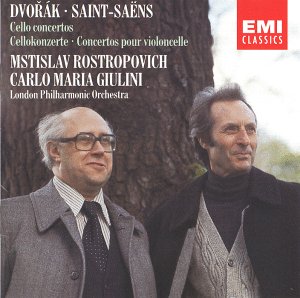Rostropovich’s playing is simply stunning, and Giulini’s
accompaniments are characteristically dignified and always attentive
to his soloist’s needs. Combined, they summon up perfectly the quasi-nostalgic
sound world of this music. The London Philharmonic at the time of recording
(1977) was at a high point in its history, and how it shows. Textures
are glowing (and expertly balanced and moulded by Giulini’s expert ear)
and solo contributions are uniformly impressive: how to single out any
one is a problem. Perhaps the lyrical horn solo in the first movement
exposition, or the woodwind contributions in the second movement?.
The exact blend of musicianship present in Rostropovich
seems ideally suited to this piece. All the moments of lyrical magic
one might expect from this source are here in abundance (the slow movement
is mesmeric), but also the virtuosity displayed is jaw-dropping and
yet at once completely at the service of the music. Tempi, as in all
great performances, persuade one that they could not be otherwise (for
example, the ‘ma non troppo’ qualifier to its ‘Adagio’ is heeded so
the music flows easily and naturally). Rostropovich’s playing reaches
dizzyingly impassioned heights in the Finale. In fact, the only real
reservation about this account of the Dvorák comes with the recording
quality (David Mottley was the producer, Neville Boyling the engineer).
Despite being typical of its period in its inviting warmth (though with
a slight muddying of detail in the lower registers), there is some uncomfortable
spotlighting of solo contributions: listen to the bassoon countermelody
beginning at 6'50 in the finale, for example.
Rostropovich himself chose the Saint-Saëns as
the coupling. His love of the piece comes through strongly. Possibly
this was a controversial choice, but the piece is not without its fair
share of influential fans. Shostakovich referred to it as the best of
the ‘great’ concertos for balance, length and shape and reputedly said
he preferred it even over the Dvorák (despite its charms, I cannot
agree!). Casals was another great performer who held the piece in his
repertoire.
The Cello Concerto No. 1 was premiered in 1873 by Auguste
Tolbecque at the Societé des Concerts du Conservatoire in Paris.
Rostropovich actually made his concerto debut with this concerto at
the age of 13, so maybe that accounts for its special place in his affections.
The score is full of joy with life, from the arresting opening (a single
orchestral chord followed by an amazing flourish for soloist) through
the minuet-like Allegro con moto with its polished accompaniment over
which Rostropovich floats heavenly - this movement is delightful - to
the more shifting moods of the finale. In lesser hands, one might be
tempted to be dismissive of this concerto, but for its duration Rostropovich
refuses to let negative thoughts even enter one’s head. The coupling
of these two concertos is a remarkably successful one, and one which
makes a straight play-through of the disc a positively life-enhancing
experience.
Colin Clarke

![]() Mstislav Rostropovich (cello); London Philharmonic Orchestra/Carlo Maria
Giulini.
Mstislav Rostropovich (cello); London Philharmonic Orchestra/Carlo Maria
Giulini. ![]() EMI GREAT RECORDINGS OF THE CENTURY CDM5 67593-2 [62.39]
EMI GREAT RECORDINGS OF THE CENTURY CDM5 67593-2 [62.39]